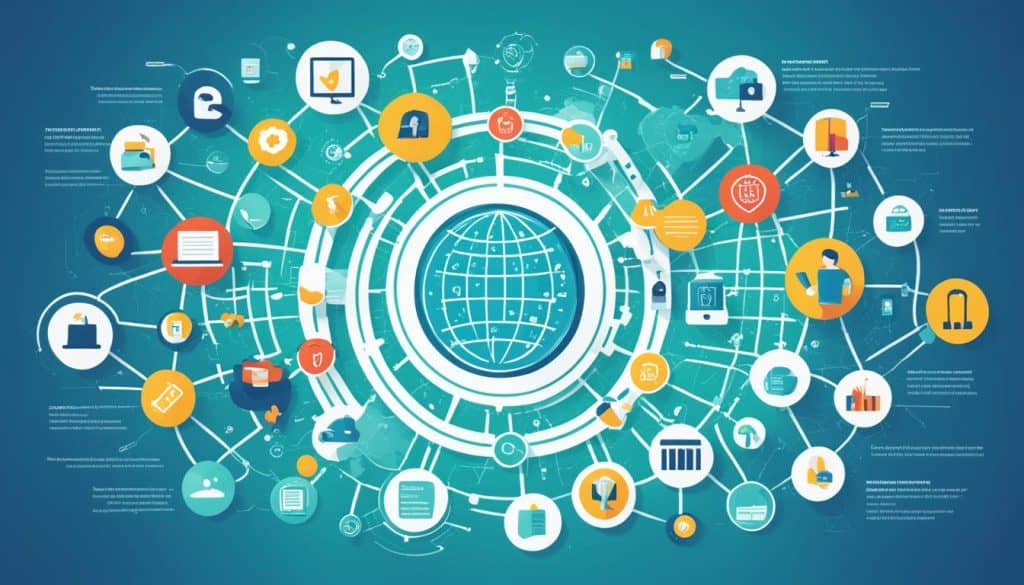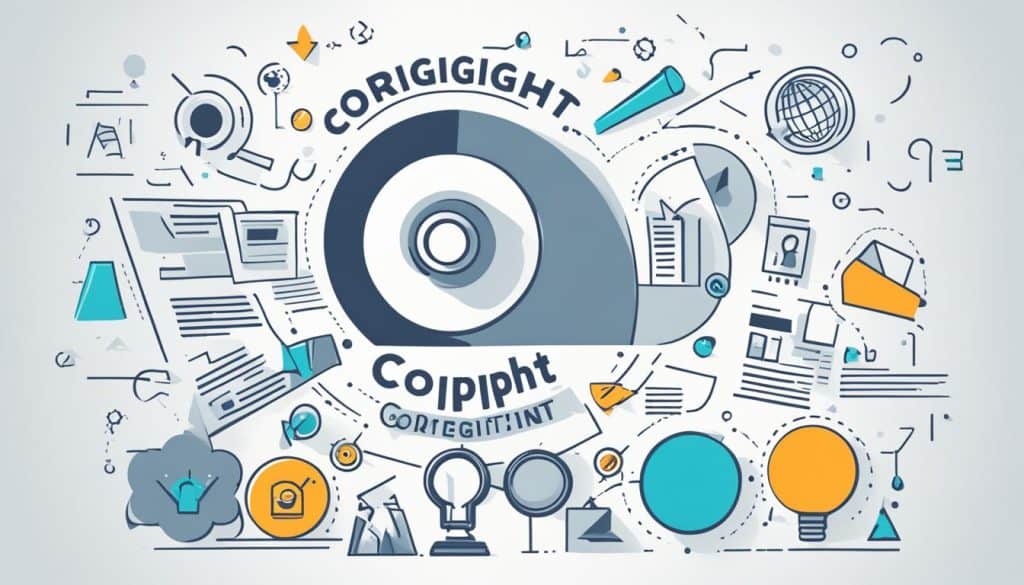
Digital law is a crucial aspect of today’s interconnected world, defining the boundaries of what is permissible and forbidden in cyberspace. It serves as a guide to ethical and legal conduct, ensuring that individuals and organizations adhere to online rules that protect privacy, intellectual property, and maintain order in the digital landscape. Understanding digital law is not only essential for maintaining responsible digital citizenship but also for ensuring one’s actions comply with established Internet regulations and standards.
At its core, digital law represents a collection of regulations tailored to the digital environment, promoting the ethical use of the internet and delineating the consequences of non-adherence. Everyone from the casual user to the professional entrepreneur must recognize the significance of understanding digital law to navigate safely and responsibly through the digital arena.
Key Takeaways
- Comprehending digital law is key to responsible online engagement and citizenship.
- Digital law comprises the rules and principles governing online behavior and Internet use.
- Adherence to digital law ensures ethical Internet usage and compliance with online rules.
- Understanding digital law helps prevent potential legal issues from arising due to online activities.
- Education in digital law equips individuals to better navigate and utilize the digital world securely and legally.
Defining Digital Law: The Ethics and Legalities of the Internet
The realm of digital law anchors its roots in the regulatory frameworks designed to supervise the complexity of internet behavior and technology use. Integral to the digital law definition is the dichotomy between ethical and unethical activities performed in the digital space. As we venture deeper into this topic, it’s imperative to discern the values encapsulating ethics of internet use and comprehend the multitude of repercussions that may emanate from breaches in digital law violations.
Concepts of Ethical and Unethical Internet Use
In the pursuit of ethical internet use, one must consider the societal expectations that dictate fairness and respect within the virtual environment. Ethical practices include respecting copyright laws, safeguarding personal data, and engaging in social interactions with decorum and integrity.
- Properly attributing digital content to its original creators
- Maintaining transparency in online advertising and communications
- Ensuring data privacy and security for all users
Conversely, the landscape of unethical internet use is marred by activities that undermine the digital ecosystem. Malpractices such as hacking, circulating malware, and perpetuating digital piracy erode the trust and security essential to a healthy digital environment.
- Hacking into systems to steal information or disrupt services
- Plagiarizing content and infringing upon copyright
- Distributing harmful software to unsuspecting users
Consequences of Digital Law Violations
Ignorance of the consequences of digital law violations is not a defense in a court of law. Individuals and organizations can face stringent penalties that not only affect their financial standing but also their reputations. Here’s an overview of the potential repercussions:
| Violation Type | Legal Repercussion | Additional Consequences |
|---|---|---|
| Data Privacy Breach | Hefty fines and regulatory sanctions | Loss of consumer trust, potential class-action lawsuits |
| Intellectual Property Theft | Civil litigation, damages, and injunctive relief | Professional discredit, exclusion from industry associations |
| Cybercrime Activity | Criminal charges, imprisonment | Social stigma, permanent damage to personal or brand image |
The consequences extend beyond the tangible to influence the very social and ethical fabric of the internet. Therefore, adherence to the digital law definition, appreciation of the ethics of internet use, and recognition of the consequences of digital law violations together form the cornerstone of responsible digital interaction.
What is Digital Law
When we delve into the intricate web of the digital landscape, understanding what is digital law becomes paramount. In essence, digital law furnishes a framework of legal principles designed to regulate the conduct and the actions performed in the vast digital expanse. It’s not just about adhering to rules; it’s a bedrock for ensuring that activities occurring within the matrix of networks are just and rightful.
At its core, a digital law explanation would reveal its role as the guardian of intellectual property, a bastion for the rights to privacy, and a mechanism for maintaining online security. Its expansive reach covers areas from the intricacies of copyright to the nuances of fair use, from the rigors of data protection to the evolving threats posed by cybercrime.
Let’s consider the pivotal aspects of digital law. Below is a table that outlines its fundamental components:
| Area of Focus | Description | Implications |
|---|---|---|
| Intellectual Property | Legal rights granted to creators for their works | Drives innovation and creativity while protecting creators’ rights |
| Fair Use Doctrine | Permits limited use of copyrighted material without consent | Facilitates educational, critical, and news reporting without stifling freedom of expression |
| Data Protection | Laws ensuring the safety of personal data online | Empowers users to control their personal information and safeguards against data breaches |
| Cybercrime | Illegal activities executed through digital means | Secures cyberspace and deters crimes like identity theft, phishing, and hacking |

In a world where digital interactions are ubiquitous, the importance of comprehending what is digital law cannot be overstated. For individuals and entities alike, the acknowledgement and adherence to digital law is a necessity—not an option—to steer through the complexities of the online environment whilst embracing one’s legal and moral responsibilities.
The Spectrum of Digital Law: Copyrights, Plagiarism, and Fair Use
The rapidly evolving digital law spectrum addresses the intricate rights and regulations implicated in the reproduction and distribution of creative content. As we delve deeper into the copyright in the digital age, a critical understanding emerges regarding the permanence and portability of intellectual property. Furthermore, the need for accessible fair use resources highlights the pivotal role that these legislative frameworks play in fostering innovation while safeguarding creators’ rights.
Understanding Intellectual Property in the Digital Age
In today’s interconnected world, the essence of intellectual property rights has transformed, demanding rigorous protection strategies. As digital media channels proliferate, safeguarding creative works against unauthorized use becomes paramount. Efforts to preserve these rights are constantly being tested by new technological frontiers, necessitating an agile approach to digital law.

Navigating the Complexities of Fair Use
Understanding the nuances of fair use is a critical skill for content creators and consumers alike. Deciphering when and how copyrighted material may be used without explicit permission is a complex yet essential aspect of operating within the digital law spectrum. Distilling the essence of these legalities into actionable guidelines fosters a culture of respect and integrity in content usage.
Tools and Resources for Ethical Content Use
Fortunately, a wealth of tools and resources is available to assist in navigating the convoluted terrain of digital law. These resources empower individuals and corporations to make informed decisions regarding content utilization and copyright compliance.
| Resource | Description | Benefit |
|---|---|---|
| Copyright Compliance Software | Automated systems that scan and identify copyright infringements | Efficiency in monitoring and protection |
| Online Fair Use Evaluators | Interactive tools for assessing whether the use of copyrighted content falls under fair use | Provides a clearer understanding of fair use parameters |
| Intellectual Property Education Platforms | Educational resources to learn about intellectual property rights and responsibilities | Enhances knowledge and application of digital laws |
Importance of Digital Law Education and Responsible Citizenship
At the heart of a thriving digital society lies the importance of digital law education. In an era where technology permeates every facet of life, imparting knowledge about digital law has become integral to fostering responsible digital citizenship. This education serves as a compass for individuals to navigate the complex online world in a lawful and ethical manner. It’s not merely about informing students but equipping them with the tools necessary to discern right from wrong amidst the digital landscape.
The curriculum of digital law education underpins the creation of informed citizens who are adept at managing their digital footprint. The value of such education extends beyond personal awareness, providing a foundation for individuals to engage in practices that protect their rights and the well-being of others in the digital community. As responsible digital citizens, individuals who are well-educated about digital law are positioned to become proactive agents in mitigating online risks, safeguarding their privacy, and enhancing the security of the collective online ecosystem.
An informed understanding of digital law significantly contributes to a well-rounded skill set for the 21st-century individual. It develops critical thinking and ethics that are valuable for life beyond screens, while concurrently shaping a safer, more respectful online environment for all users. Ultimately, the role of digital law education is paramount in nurturing a culture of responsibility and respect in the digital realm—an investment in both the present and future of our digital society.
